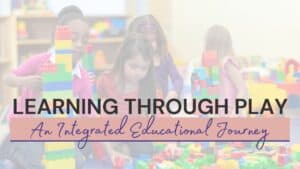
Learning Through Play: An Integrated Educational Journey
When your child learns differently, school can become an unrelenting daily struggle that eats away at the emotional strength of even the most resilient child.

Explore these three ways to help your child navigate challenging peer relationships. Then, you can help them develop positive and healthy friendships.
“I’m sorry to call,” Lucy’s mom said, “but your daughter and her friends seem to be excluding Lucy from their activities. Could you please ask Sara if they could include Lucy?” I started to think, what do I do when I’m told my doesn’t like your kid?
The mother’s request made my wife and me uncomfortable. It was an honest plea from a parent whose 12-year-old felt rejected. But to us, it felt like she was accusing our daughter of being exclusive. It also felt like a parenting issue — our kid was doing something that hurt someone else, and we needed to stop it.
No parent wants their kid to be hurt or to hurt others. But it’s a fact of life that we’re naturally more drawn to some people than others. So how do we teach our kids to respond to peers who aren’t their “besties” or who rub them the wrong way? Scripture tells us to love one another. Does that mean we also need to like one another?
Most of us are naturally drawn to those with whom we share common interests and values. And kids are no different. When my third-grader talks about someone he doesn’t like, I can’t force him to change his mind. But I can teach him to treat that person in a way that shows respect.
Social skills are learned, and the lessons we teach our children now can last a lifetime. Here are three suggestions to help shape our children’s social GPS:
When we notice attitudes in our kids that need revision, it’s natural to just tell them what to do. But sometimes, hasty advice shuts down the conversation. Logic doesn’t change feelings, but listening can.
When our kids express dislike for someone, we can ask open-ended questions:
By listening carefully to the answers before we offer advice, we can help our children think through the deeper issues at play. Then, we can identify with their feelings: “It sounds like you’re frustrated when Jacob says hurtful words. That must be really tough.”
During conversations like these, my wife and I were tempted to jump to a solution right away. But we learned to resist blurting out advice. As we listened, our children felt “heard,” and we built trust. Then, the next time they had a people-problem, they were more open to having a conversation with us to help find a solution.
When our daughter was young, we taught her to treat others with respect. We assumed she’d hear our instructions and put them into practice. One day, I walked into her room to see her disciplining her dolls. She didn’t speak to them in the respectful way in which we had taught her, but with the harsh words we sometimes used while disciplining her. She may have heard what we said, but she did what we did. Our children watch how we interact with challenging people in our lives. The way we respond is likely how they will respond also.
Play is a great avenue for children to learn relationship skills. When our children were young, we would make their stuffed animals “talk” about another stuffed animal they didn’t like. Then we guided the conversation toward solutions that demonstrated kindness and respect. This exercise allowed our kids to pick up responses they could use in their real-world relationships.
One day, my son and I were trying on ski goggles at a sporting goods store. His had yellow lenses, while mine had blue. I pointed at a jacket across the room and asked, “What color is that jacket?”
“It’s yellow,” he said.
“Nope,” I responded. “It’s blue.”
He thought I was crazy. He was seeing yellow, so he assumed he was correct and I was wrong. We took off our goggles; the jacket was white.
We all see others through our own lenses, and it’s easy to assume that we’re right and the other person is wrong. In reality, they’re just different — and it’s part of God’s design. Our kids learn to respect others when they learn to value their differences. It’s not a matter of who’s right or who’s wrong; it’s seeing them the way God does. Not everyone is going to be our best friend, but we need to see them as a person with value.
When your child is struggling with someone she doesn’t like, ask what others and God like about that child. For example, you might say, “So, Jacob really bugs you. What do you think his friends like about him? What do you think God likes about him?” Follow that up by asking why she thinks Jacob acts the way he does. Then brainstorm some creative ways she can respond when she’s upset with Jacob, but remind your child that she’s responsible for herself, not for the other person.
In Matthew 7:12, Jesus proclaimed: “Whatever you wish that others would do to you, do also to them.” For our kids, remembering the Golden Rule is the key to navigating relationships in a way that demonstrates respect. As we help them discover how they like to be treated by others, this becomes the standard for how they treat others.
We told Lucy’s mom we would talk to our daughter, and we did. But we didn’t force Sara into an artificial relationship. We explored her feelings, brainstormed ideas and helped her learn how to treat Lucy with kindness and respect.
Did they become best friends? No. But they did become good friends — and they discovered a valuable relationship in the process.
Dr. Mike Bechtle is a sought-after speaker and the author of People Can’t Drive You Crazy If You Don’t Give Them the Keys and I Wish He Had Come With Instructions.